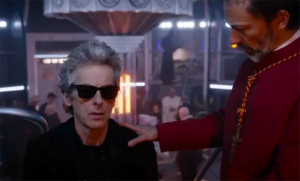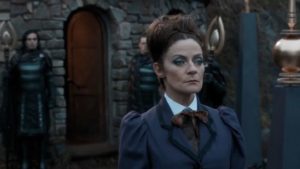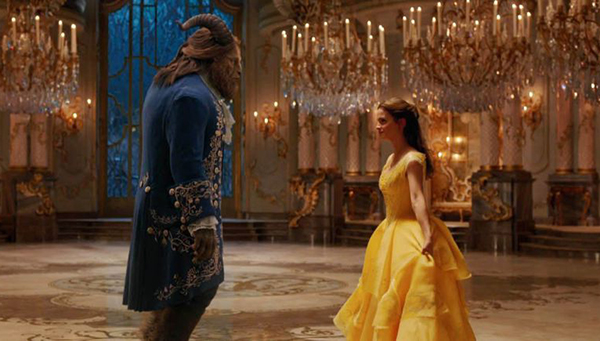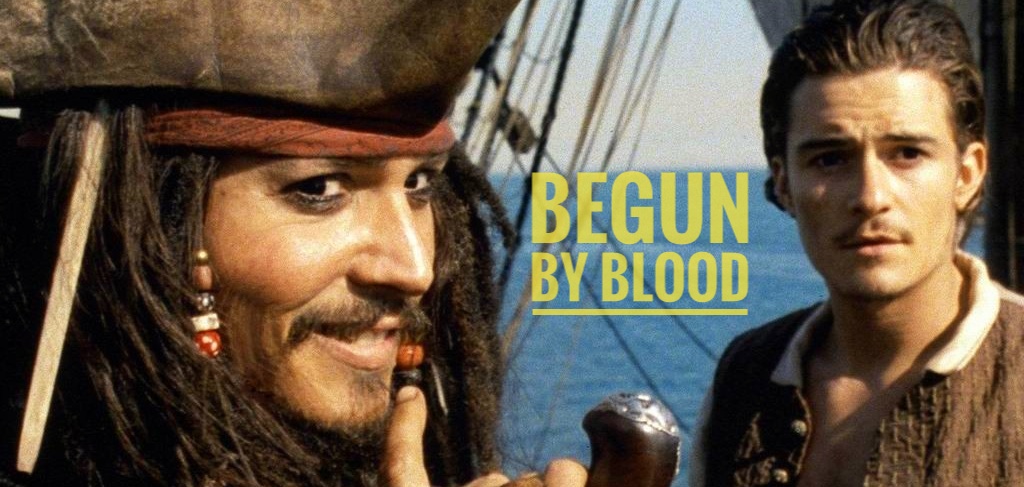If you’re anything like me you probably sat in confusion for most of “Extremis.” That’s okay though, because that’s exactly what Steven Moffatt wanted. Why? No real reason other than to just keep you guessing. It’s textbook Moffatting. Despite this fact, I think the episode ultimately worked for setting up some interesting things to come. In the aftermath I was left with one word on my tongue, and that was the very Spock-ian, “fascinating.”
Nothing that happened inside the holographic/ parallel world was real, so we basically have to discount all of it save for the idea. For instance, the Doctor “borrowing” from future regenerations to fix his blindness will have no implications to the real Doctor. But the fact that an alien race could create a holodeck version of our world (bonus points for a second Star Trek reference this season) in order to learn how to conquer us is quite interesting, and fun for Who to explore.
There are actually two separate events happening in this episode. The holodeck versions of the Doctor, Bill and Nardole discovering what’s going on with those ghostly Monks, and somewhere “a long time ago” (now we’ve got a Star Wars reference) the Doctor is present at the planned execution of Missy. These two events don’t really affect each other, but they share a pivot point that has some eternal implications.
“Goodness is not goodness that seeks advantage. Goodness is good in the final hour, in the deepest pit, without hope, without witness, without reward. Virtue is only virtue in extremis. This is what he believes, and this is the reason above all I love him. My husband, my madman in a box, my Doctor.” – River Song
 Yikes. That’s a heck of a pronouncement to live up to, huh? Virtue in extremis, or virtue at the point of death. Set aside the Christ parallel for a moment and think about that kind of goodness. What does it take to be good when it means your certain death? To be good when everything in you is fighting against it?
Yikes. That’s a heck of a pronouncement to live up to, huh? Virtue in extremis, or virtue at the point of death. Set aside the Christ parallel for a moment and think about that kind of goodness. What does it take to be good when it means your certain death? To be good when everything in you is fighting against it?
I’m reminded of a moment from last season, when the Doctor encountered Lady Me after her gifted immortality caused her pain and loss for hundreds of years. And though she begged him to help her escape her life, he knew he couldn’t because, as he told her, “it wouldn’t be good.” On a macro level, that kind of dedication is astounding, and one that a Christocentric view believes mankind is essentially incapable of. On a micro level, it makes for one heck of a hero. Heroes like that are in short supply on TV these days.
“Funny. I don’t believe much. I’m not sure I believe anything. But right now, belief is all I am.”
 If this kind of goodness is to be realized, the thing to make it so is belief. Faith is evidence, something real and powerful to hold to when we face even life’s greatest dangers. Belief fuels goodness, and the practice of goodness proves our belief. And it goes beyond morality. Right and wrong cast only a small light on reality, whereas good and evil are technicolor. Lady Me believed it was the right thing to free her, but it wasn’t good. This new-found planet of executioners believed it was right to kill Missy (and all other life for some reason). The Doctor knew that despite the evil actions Missy had performed, it wasn’t good to kill her.
If this kind of goodness is to be realized, the thing to make it so is belief. Faith is evidence, something real and powerful to hold to when we face even life’s greatest dangers. Belief fuels goodness, and the practice of goodness proves our belief. And it goes beyond morality. Right and wrong cast only a small light on reality, whereas good and evil are technicolor. Lady Me believed it was the right thing to free her, but it wasn’t good. This new-found planet of executioners believed it was right to kill Missy (and all other life for some reason). The Doctor knew that despite the evil actions Missy had performed, it wasn’t good to kill her.
That’s what makes a hero. True goodness transcends morality and defeats evil. It foils the villainous and turns enemies into friends. It really is fascinating to watch a hero strive for true goodness. But that’s what one should hope for from a Doctor, after all. We’ve seen this in wonderful and heartbreaking ways from all the Doctors, and as Twelve reaches his final hour, expect no less. It will be without witness or reward, and in extremis. And it will be just what the world needs.
Next time on Who-ology:
We’re in the midst of a three-parter, and it looks like these monks will be a real threat to face. They seek to destroy the planet using “humanity’s own hand.” Naturally, we’ll need the hand of a Doctor to help point us in the direction of goodness.


